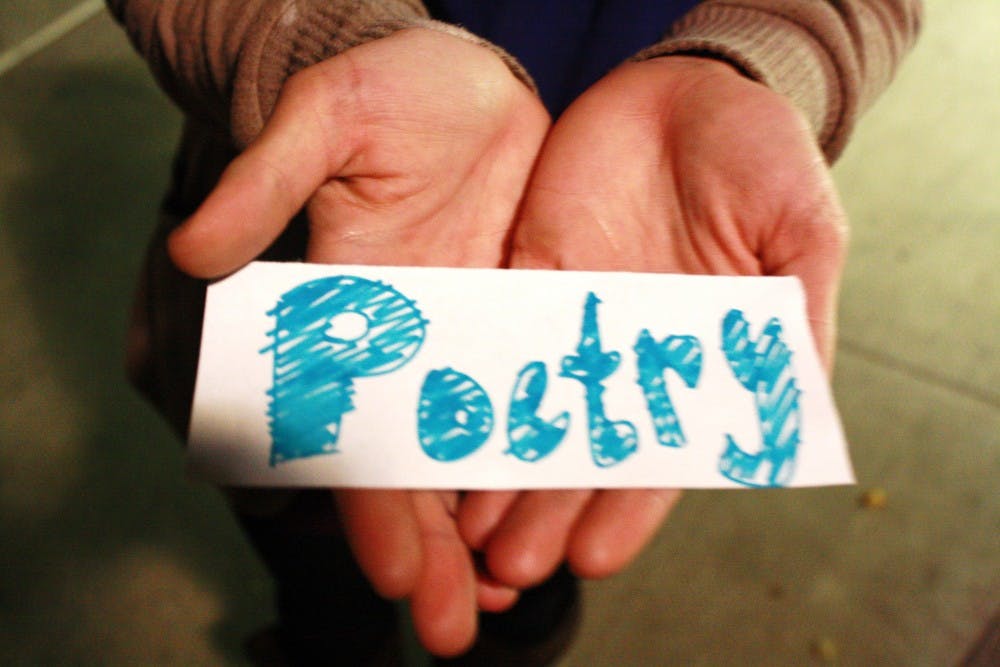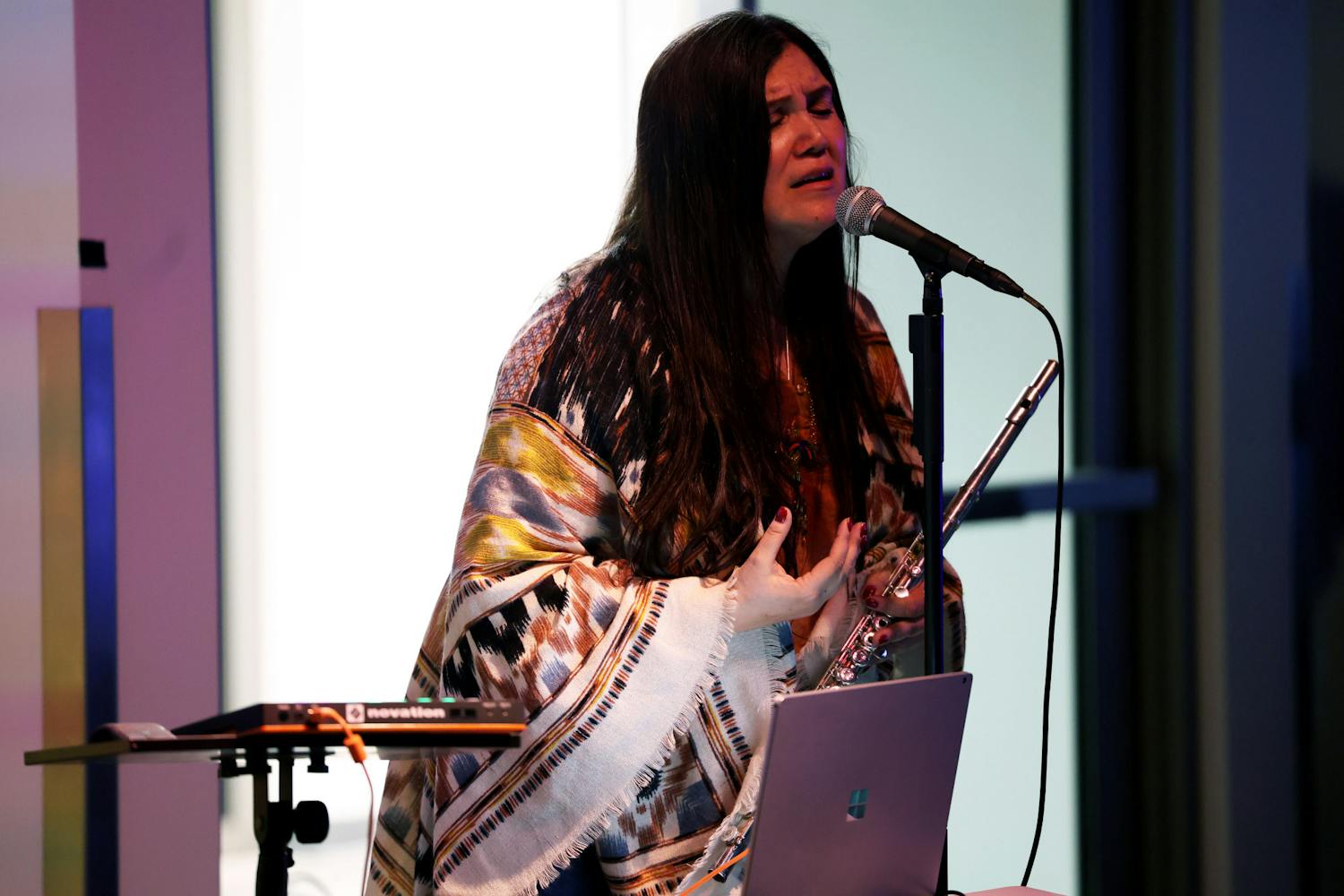 For SPM writer Kharli Mandeville, public speaking haunts her despite her ability to animate personal conversations.
For SPM writer Kharli Mandeville, public speaking haunts her despite her ability to animate personal conversations.Photo by Noemi Gonzalez
My stomach twisted in knots.
It churned almost painfully with the coming anticipation. My face grew hot; it was probably beet red. The blood in my body boiled and vibrated throughout every limb. Tears formed beneath my eyelids, threatening to burst and stream down my cheeks.
I was eight weeks into my second semester at ASU, and I had just raised my hand for the first time in a large lecture class.
My voice cracked and shook. My film professor asked me to repeat my statement. Something about how the cinematography of a particular scene in a film really moved me — nothing of significance by any means.
I’ve always been described as a social butterfly, and in truth, I am. In personal conversations I am animated and often excitable. And just as any other 20-something-year-old college student, I do enjoy social gatherings.
But force me into a situation where more than maybe a dozen pairs of eyes suddenly snap in my direction — situations where the calming flow of whiskey is generally and unfortunately sorely lacking — then I’d love nothing more than to shrivel away.
I’m not exactly sure when the fear of speaking in public began to haunt me — probably somewhere around the time I refused to audition for plays in high school (I loved theater as a kid) and around the time I fell in love with persuasive writing yet refused to join speech and debate.
 Writers sometime are recluses, and when the time for reciting abounds, the pressure then builds.
Writers sometime are recluses, and when the time for reciting abounds, the pressure then builds.Photo by Noemi Gonzalez
At the university level, in-class presentations are a form of personal torture. Teachers —FINE — I’ll write that 12-page political analysis whatever thing, but please dear God don’t make me present it to a class of thirty!
It’s common knowledge that to do the job and to do the job well, a journalist must be able to talk to people. But normally, when writing a story, I only need to converse one-on-one with the people involved in bringing that story to life. Piece of cake.
Basically, a journalist spends a lot of his or her time writing. But depending how much they write, it can make one reclusive. Some people may really only know them through print, or worse, super wordy Facebook updates. The problem is, as a writer, they may begin to personify themselves as more eloquent and quick-witted than their real-life persona. People read what they write, then meet them in person, and realize the writer is actually kind of awkward when they stammer hellos and trip over themselves during handshakes. (Uhh, I mean, I’m totally just giving a hypothetical scenario here. I never tripped during a handshake.)
I realize this about other writers and I realize it about myself. But from around the time I choked on my first spoken words in an ASU class, I knew the weird, painfully awkward public speaking thing was something I’d need to get over, and fast.
Last year, I wrote a story on Lawn Gnome Publishing, a used bookstore in downtown Phoenix. I made quick friends with the owner, Aaron Johnson, who has since grown to be one of my favorite local poets. I began working in the store in the beginning of last summer.
In the evenings we host a series of events. Monday nights were, and still are, open mic nights. Thursdays are slam nights. I started hanging around other writers — particularly spoken word poets. I spent the majority of my warm summer nights, swimsuit tops subbing for bras, kicking it on the porch smoking cigarettes and sneaking beers from the local watering hole. I watched in awe as other writers stepped up to the microphone, light blinding their eyes, shadows outlining their faces, and actually presented their writing to dozens of people.
 Slam poetry is about the performance and passion, an outlet that gave way for Mandeville to put aside her fear for public speaking and present her words.
Slam poetry is about the performance and passion, an outlet that gave way for Mandeville to put aside her fear for public speaking and present her words.Photo by Noemi Gonzalez
Sometimes they were nervous, yeah. But most of the time they reeked of confidence and just plain swag. I was jealous.
Everyone wants a little swag, you know?
The first time I showed up on a Thursday I was hooked. I’d never heard slam poetry before. I’ve always loved the tradition of old-school rap and hip-hop. To me, this was just like that. (Think Tupac’s poetic flow without the pressure of trying to be hood.)
I’d sit cross-legged, leaning against the beam of the porch. I’d leave at the end of a particularly inspiring night, ride my bike in the mid-summer night heat, rushing home to scribble poetry in a tattered notebook on pages I’d later crumple and throw away.
I kept this routine up for months. For months I told everyone I was falling in love with poetry. That I was going to perform poetry too one of these days.
By the end of the summer, I finally grew enough balls to show up on an open mic night with something to say.
I mean, I was and definitely still am new to poetry, so it wasn’t like, some epic, philosophical call for social justice in Darfur or something.
So I signed up.
What looked like normal ink scribbled with a regular, every-day pen, actually turned out to be my own blood. With my chicken scratch of a signature, I had just sealed my fate. I sold my soul to what would soon become an addiction.
I sat in the audience, hands shaking uncontrollably as I lit a cigarette to relieve the anxiety.
Then I heard my name.
I stood up and dozens of people looked at me. God, why do they always have to freaking look at you?
I shuffled up to the stage, staring at my feet and feeling the finality of my terrible decision with every step I took. Normally when you walk, you don’t pay attention to the fact that you’re actually walking, right? But no, this time, I knew that every step was one step closer to my doom. Everyone was going to laugh. I knew it.
I finally made my way to the mic and steadied my hand around its cool frame (which juxtaposed awkwardly with the heat of the night). I glanced up for a millisecond and a beam of light blasted me in the face. I squinted, looked to my left, and great. Someone was recording. Awesome. I could later view and relive one of the most humiliating nights of my life on YouTube with the rest of the world.
Performing poetry puts a spotlight on the speaker, making him or her feel vulnerable or powerful. Photos by Noemi Gonzalez, Video by Luu Nguyen Stop Motion from The State Press on Vimeo.
Well, I decided, I’m already here. I can’t escape now. I spoke and told everyone it was my first night. In fact, it was my first time speaking into a microphone. And as I said these first words, I heard my own voice echo throughout the crowd and into the ears of perfect, faceless strangers.
That was the worst part, hearing my voice that loud for the first time in my life. I discovered I have a slight lisp.
I didn’t bother trying to memorize, the way my favorite poets always did. So I pulled crumpled pieces of paper out of my pocket and began to read.
My hands were visibly shaking. I remember that for sure. Everyone could probably hear those papers fluttering in my small, unassuming hands that suddenly became the focal point of my very existence. I’ll never watch that video footage because I’m sure I’d never do poetry again.
I persevered. My hands continued to shake, but people kept listening. My confidence mounted and my breathing steadied.
It’s all sort of a blur now. The experience seemed like hours of mental punishment, like earwigs digging in my ears to torture me into admitting to a war crime or something. But looking back now, it was probably more like a minute and a half of me reading a silly, albeit halfway decent, poem in front of 20 people.
I finished and everyone clapped. I got a few high-fives as I made my way back to my seat.
Admittedly, that poem sucked. It was silly, and it wasn’t honest. But that’s totally OK. A part of growing as a writer, or as an anything, really, is recognizing the life experience and maturation progress that illustrates how far we’ve come, and what we are able to survive.
And even though that experience was terrifying, I kept doing it. Every week. I still do. And it’s still terrifying. Though I wouldn’t say I made my way past the fear completely — I did make an effort to change a part of myself I didn’t want to live with, and I keep trying.
That night, I left the stage an entirely different person than the one who choked on her first words in a film class.
And I don’t think I’ll ever be the same.
Reach the writer at kharli.mandeville@asu.edu or via Twitter @kaharli




